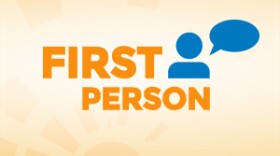This Memorial Day, we are sharing the story of Carlsbad veteran Bill --. He was with the ninth Regiment during a 70 seven -- 77 day siege. The 19 suffered high casualties and earned the nickname entitled the walking dead. In this first feature he remembers an earlier experience that would be diagnosed as PTSD. It led him to start a nonprofit American combat veterans of war to help other veterans heal from war . >> I do access memories when we were literally wiped out on the hill. When we walked into an ambush of hard-core MVA with sniper weapons. Everything was a head and a heart shot. It was ghastly. I lost most of my squad. It is tough to talk about. But you have to as I indicated dissect and go over it and finally arrive at some kind of serenity. Was there anything I could do? The logical answer to that is no. There wasn't. I did as much as I could. I tried to save. My Brothers. When I first got back to my hometown in Ohio, and eight truck or car backfired, I found myself lying on the sidewalk envisioning the rest of the shots to come. I kind of laughed, chuckled. But something told me there was something wrong. The diagnosis of post traumatic stress disorder, came out in 1980. But I still did not go to the VA or to the Doctor somewhat chagrined about my situation. I just kept busy. I kept my brain busy. And I stuffed it. I did not think about it until 1999. A doctor named Kevin flood at the VA in La Jolla was told to interview me at the request of my cardiac surgeon. She diagnosed it. I don't know how she did that. I spoke to him for five minutes. He said, well Bill, you have posttraumatic stress. And I said, Doctor, really only talk to me for five minutes. And you have made a diagnosis that important? How could you do that? He said Bill, that is what I do. He was right. So I entered all these programs anger management which I fell 3 times I'm quite proud of that. And all the other programs. And then there was nothing else to do. There was no new programs. A great mentor of mine chaplain William PD, he said you can make a difference and try to start a program that is relevant. So we started in 2001 pre-9/11 American combat veterans of war. We winged it at first. We were canning experience on how to talk to Vietnam, World War II, Korean War veterans. They were the toughest the deal with. The Korean War guys. They really stuffed it they had no sense of anything being wrong with them. They just accepted it. And then 9/11 hit. We really had our hands full. I made it a point to learn as much as I could about this and be as proactive as possible. Because I felt that if I could relate to them with my own trauma, issues, possibly I could make a difference. For the longest time, the Marine Corps called it an anomaly. We said let's do this. It is not a disorder. It is something that is going to happen to a human being. Human beings are not meant to see their best friends killed in front of them. Quite grotesquely and visceral. We are not meant to kill people at random. We told the young Marines that they are not week. It is normal to happen to drink to feel or to use drugs. But you cannot do that all your life. You have to have answers. And we will be there as your support network. We will have the answers because look at us now. Thank God they bought into that. I think the rest is history. There is one Marine in particular who had two deployments to Iraq. He was housebound. He would not leave his room. His wife was very worried about him.'s mother called me. We help this Marine. Today he has found his calling. It is much like ours, helping people. Helping veterans. It is the realization that we are making a difference. Making the world a better Place. And saving lives. That's what I look at. I do not want it to stop. Just because I'm getting older than dirt, I am still going to stay in the trenches. >>> That was Vietnam war veteran Bill Ryder. His story was featured in the annual PBS Memorial Day concert held last night at the U.S. capital. To see a video Roger story, go to our website at KPBS.org. The first person peach -- feature was produced by Megan Burke.
This memorial day Carlsbad war veteran Bill Rider's story is being shared nationally. He was featured in the annual "National Memorial Day Concert" held Sunday at the U.S. Capitol and produced by PBS.
A sergeant in the U.S. Marine Corps' 1st Battalion, 9th Regiment, Rider served in Khe Sanh in 1968 during a 77-day siege by the North Vietnamese Army. His squad suffered high casualties and earned the nickname, "the walking dead."
As part of our First Person series, Rider remembers an early experience with what would much later be diagnosed as post-traumatic stress and what led him in 2001 to start a non-profit, American Combat Veterans of War, to help other veterans heal from the wounds of war.







